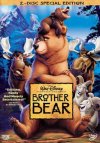BUY THE DVD:
|


|
|
|
SYNOPSIS:
| |
a young native american hunter seeks vengence against a bear, only to be magically changed into a bear himself.
|
|
|
MOVIE FACT:
| |
the moose characters, tuke and rutt, played by rick moranis and dave thomas, respectively, are essentially animal versions of their most famous roles as the goofy canadians, bob and doug mckenzie of sctv fame.
|
|
|
RATING:
|



one out of four possible stars
|
|
|
|
(Note: this review refers to a viewing of this film via digital projection)
A charming and beautiful film, Brother Bear doesn't represent the best of Disney animation, but it certainly harks back to just a decade in the past when Disney animators were at the top of their game. It is safe to say that much of the Disney "magic" has been the result of superior soundtracks and catchy songs, as films like The Little Mermaid and Beauty and the Beast were quite dependent on their beautiful music and songs. But after the renewal of the Disney "charm," the spark and life present in nearly every animated feature seemed to have gone dormant, as no soundtrack since the wildly popular Lion King has garnered such public and critical approval.
And though the visual feast for the eyes presented in Brother Bear will wow any viewer with its beauty, the vocal portion of Disney's successful formula just isn't in the cards this time. What is Cinderella without the singing mice? What is Sleeping Beauty without Aurora singing in the forest? How incredible an amount of vitality and life is given to animated characters when the audience is stimulated not only visually but aurally as well. Using the truly innocuous voice of Phil Collins, Brother Bear is not a feast for the years during the musical numbers, though the score, composed by Mark Mancina, is of the usual high Disney standard. But all of Collins's songs sound exactly the same.
And they all relay the same tired message that is visited upon quite often enough by the characters on their own. It's a certainty that a Disney film will contain within it some sort of lesson to be learned by the younger members of the audience, but that message becomes somewhat too obvious when Collins delivers it verbatim in each of his songs throughout the picture. The mildly entertaining Tina Turner song that runs in near the beginning of the film is a nice distraction, but when Collins takes over, some of that Disney formula is trampled upon by tired lyrics and a voice without a lot of personality.
But barring further comments against the music (the songs are really the only music at fault as Mancina's score is quite beautiful in places), Brother Bear uses the Disney formula in its very familiar method, and though it's something you've doubtless seen in several animated films from the Mouse House in the past, the fact remains that the formula works. When Disney sticks with it, they are rewarded with good box office success. Films like Atlantis, which was wholly lacking in musical numbers, was a dark journey for Disney animators, and the result was not a success.
The more recent Lilo & Stitch was more innocent and heart-felt, and though it seemed more suited to home video release, was a closer step to the tried and true formula that Disney has used for over half a century. There is simply no reason why the Disney folks can't continue to create successful animated films using the same ideas and tenants of the films of their richly colored past. It is disturbing to note that the company (at the time of this writing) currently has no traditional cell animation feature films in production, as they are obviously capable of creating an entertaining and enjoyable animated feature.
Though the success of the computer animated Pixar films have eclipsed the box office of all recent traditionally animated Disney films, seeing the company abandon the method of creation, which has kept their name on the map, is disappointing. The idea that traditional animation is no longer appealing to audiences is a false truth, even though the box office take of computer animated films has completely trounced upon the fortunes of cell animation. Audiences haven't forsaken hand-drawn animation. They've only made it clear that well-made films, whether they are hand-drawn animation or computer-generated images, result in critical acclaim and large box office success.
Pixar's films have simply had more "magic" than the most recent stories Disney has created for hand-drawn animation. Create a film of the caliber of The Lion King and audiences will flock to the theaters. Create a film like Cinderella II: Dreams Come True, and audiences will shun the product. Brother Bear is a step in a very encouraging direction, and even though the requisite message is hammered through just a little strong, the movie still contains a lovely story and some quite hilarious comedy. Rick Moranis and Dave Thomas are really the standout vocal performances as the noodle-headed Canadian moose duo "Rutt" and "Tuke" and whenever those characters appear on screen, laughter will be heard throughout the audience.
As main character "Kenai," Joaquin Phoenix makes an affecting appearance in animated form and Jeremy Suarez, playing "Koda," seems to have vocal talent as well. "Acting" in an animated feature is obviously a different task from performing in front of a camera and each of the actors in Brother Bear seems to have a talent for infusing life into their two-dimensional characters. The film is beautiful to behold and when Phil Collins isn't singing, it's both heartwarming and entertaining to listen to and is a step in a very good direction for the animators at Disney.
Review by Kelsey Wyatt.
| |
|